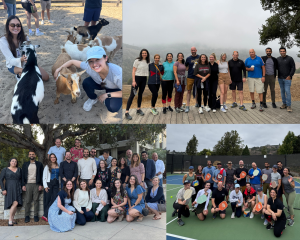Last week the Lewis & Llewellyn team gathered in San Francisco for our annual holiday party, and we were reminded once again how fortunate we are to work with such an incredible group of people. We are grateful to have had so many opportunities to spend time together in 2025, and we look forward to many more in 2026. We wish you all a very happy holiday season and a joyous new year!
Author: Caroline Recupero
California has just revived a time‑barred pathway for adult survivors of sexual assault. Under AB 250, a new two‑year “look‑back” window (Jan. 1, 2026–Dec. 31, 2027) will allow survivors to file civil claims, even if previously barred under the statute of limitations, against perpetrators and private entities that allegedly covered up or attempted to conceal prior conduct. The assembly bill explicitly excludes public entities such as public schools, police departments and other state agencies.
AB 250 also revives related causes of action tied to the assault, such as wrongful termination or sexual‑harassment claims arising from a cover-up.
Importantly, AB 250 extends protections to claims not covered under AB 218, giving additional survivors the opportunity to pursue claims against not only the perpetrators but also the private entities that helped shield them.
Lewis & Llewellyn remains dedicated to representing survivors of sexual abuse and assault in civil actions against perpetrators of abuse and institutions that enable it.
Please email abuse@lewisllewellyn.com if you have a claim to pursue under AB 250.
Lewis & Llewellyn attorney Marjon Momand attended the National Association of Muslim Lawyers 2025 Annual Conference last month in Irvine, California. The three-day event brought together Muslim legal professionals, scholars, and advocates from across the country for networking, professional development, and cutting-edge discussions.
Marc Lewis also co-hosted a Bay Area UCLA Law alumni event last month at the San Francisco Gibson Dunn office, which was attended by fellow Bruins Ryan Erickson and Newton Oldfather. The gathering brought together former classmates and colleagues for an evening of reconnecting over drinks. For updates on future events, join the UCLA Law Bay Area Alumni LinkedIn page here.
Paul Llewellyn recently hosted a British American Bar Association (BABA) Happy Hour at Heartwood in San Francisco, bringing together British and American attorneys practicing in the Bay Area for an evening of conversation and connection. The event offered a great opportunity to reconnect with colleagues and build new professional relationships within the international legal community.
Our team is growing rapidly, and we are thrilled to welcome our newest associate, Jackson Willis, to the firm!
Before joining Lewis & Llewellyn, Jackson was an associate at Paul, Weiss, Rifkind, Wharton & Garrison LLP. There, he defended clients in multiple securities class actions and advised them as they conducted internal or responded to government investigations. He also maintained an active pro bono practice focused mainly on immigration matters.
We are excited to add Jackson to our growing bench of elite litigators—and this is just the beginning. Stay tuned for more additions to the L&L team in the new year.

The Lewis & Llewellyn team recently gathered in Carmel Valley for our annual firm retreat. Between lively pickleball matches, meeting ranch animals, and team dinners in Carmel-by-the-Sea, we enjoyed the chance to connect, recharge, and celebrate another great year together.
We’re grateful for a team that brings dedication, collaboration, and plenty of fun, both inside and outside the office.

Governor Gavin Newsom signed Assembly Bill 931, the California Consumer Legal Funding Act, into law last month. AB 931 establishes comprehensive regulation of Consumer Legal Funding, providing important safeguards for consumers while preserving access to financial support during the resolution of legal claims. The law takes effect January 1, 2026.
AB 931 requires Consumer Legal Funding companies to provide clear, written contracts detailing the amount of funding, all fees and charges, and a payment schedule. Consumers are also granted a five-business-day right to cancel without penalty. The Act strictly prohibits funding companies from influencing legal claims, paying referral fees to attorneys, or steering consumers toward specific legal representation.
By setting transparent rules and robust consumer protections, AB 931 ensures that litigants can access financial assistance while pursuing justice safely and responsibly. This legislation aligns California with a growing number of states recognizing Consumer Legal Funding as a non-recourse, consumer-centered financial service—designed to support individuals’ essential needs, not influence litigation outcomes.
Marc Lewis and Grace Ramirez presented for In-House Connect on NDA enforcement and pitfalls, alongside Todd Smithline from Bonterms. More than 700 in-house professionals attended, and the presentation sparked meaningful discussion across professional networks. The webinar is available on demand here.
Paul Llewellyn recently attended the Perrin Conference on Sexual Abuse Litigation and Coverage in New York City, where he spoke about handling the media in high-profile cases.
